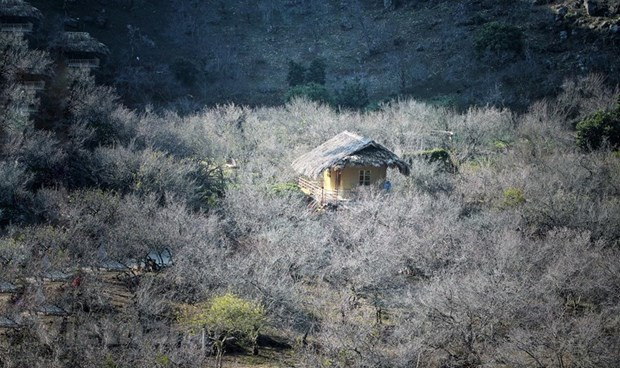
It boasts a range of stunning landscapes year-round. The region’s scenic beauty is at its best during late winter and early spring when apricot, plum and peach blossoms begin to fully bloom, creating a picturesque scenery in the north-western region.
Late winter sees apricot flowers in bloom in almost every corner throughout the region. Similar to plum flowers in appearance, apricot blossoms have distinguished small white petals.
Despite their immense beauty, local people state that the apricot flowers are often only in full bloom for a week before quickly fading away.
Apricot trees are often planted in large gardens and along the mountain slopes. The beauty of the apricots and apricot forests makes them must-visit destinations for those who come to Moc Chau plateau.
Normally, in January and February, the white color of the apricot blossoms covers all in the plateau, charming visitors right at the first sight.
Apricot blossoms in Moc Chau often bloom in the area of Long Sap border gate. Across the communes of Chieng Son and Muong Sang, and Moc Chau township, the hillsides are covered with the white flowers.
Many people describe the pure beauty of this flower as “a muse in the Northwestern mountains and forests." Compared to many other flowers in Moc Chau, the apricot blossoms give a different feeling.
Located about 200km to the west of Hanoi, at an altitude of over 1,000m, Moc Chau plateau in Moc Chau district, Son La province is an ideal destination in the journey of exploring the Northwest region thanks to its cool and fresh atmosphere, endless green tea hills, gardens of plum and apricot trees and various flowers, etc.
Located in Son La province, 180 kilometers from Hanoi, Moc Chau, one of the biggest plateaus in the country, stretches some 80km long and 25km wide, and stands about 1,050m above sea level.
As a result, its average temperature is a cool 16-26 degrees Celsius. In the winter, from Pha Luong and Van Ho peak, visitors can view the beautiful 50,000-ha plateau through a thick fog.
Moc Chau is home to many tourist attractions, such as a floating market on Da River, Doi Cave, Son Moc Huong Cave, Ang village pine hill, Dai Yem waterfall, five caves in On Village, Xuan Nha National Nature Conservation Area and the 1,500m-high Phieng Luong peak.
The system of archaeological sites along the Da River, including Tang Me burial cave, animal fossils at Chieng Yen, and marks carved in stone of Xuan Nha area, as well as other historical sites, are a well-known tourist destination in Moc Chau. Besides the sites, Moc Chau also has many hot springs in Muong Khoa, Phu Mao, Bo Village and Hua Pang.
Moc Chau is also the gateway to the Northwest, and the stopover for inter-regional tours such as Hanoi-Son La-Dien Bien Phu-Sapa-Lao Cai; and the transnational tourism routes such as Hanoi-Son La-Luang Prabang (Laos) - Thailand; and Son La-Lai Chau-Yunnan (China).
Tourists visiting Moc Chau will discover diverse and unique cultures of the indigenous ethnic groups, including White Thai, Muong, Mong, Dao, Xinh Mun and Kho Mu. With different customs, ethnic groups have created a wide range of cultures and festivals./. VNA